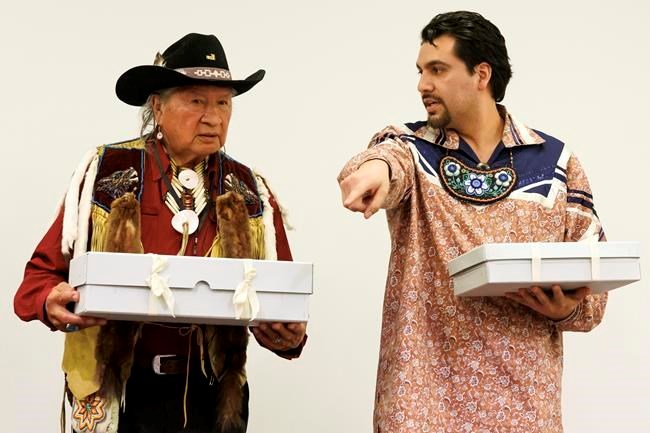MONTREAL ‚Äî Two artifacts sacred to some of Canada's Indigenous peoples are now back on home territory after a Swiss museum returned them to the Haudenosaunee (Iroquois) confederacy this month.¬Ý
The objects, a medicine mask and turtle rattle, had been in the possession of the Geneva Museum of Ethnography (MEG) for nearly 200 years.¬Ý
The museum acknowledged last month that the artifacts were originally acquired without consent, noting in a press release it was taking the unprecedented step of returning them as part of its commitment to ensuring both human remains and sacred objects are restored to their rightful owners.
Mohawk elder and activist Kenneth Deer ‚Äî one of the three men sent to retrieve the objects ‚Äî said he was "surprised and thankful" for the museum's co-operation and called the MEG "progressive" for returning the objects without conditions or complications.¬Ý
"It was a very quick turnaround because sometimes it takes years to get objects back from a museum, especially from a foreign country. It was a really good experience, and I think it's a model for other museums to follow," Deer said in an interview on Friday.¬Ý
Deer said the mask was first spotted back in July by Tuscarora Brennen Ferguson, who, along with Deer, is a member of the Haudenosaunee external relations committee.¬Ý
In November, the committee wrote a letter requesting the return of artifacts to Canada. The museum and the city of Geneva, which founded the MEG in 1901, approved the request.¬Ý
"The museum was very cooperative, and more than that, they were just respectful," Ferguson said. "(After I first saw the mask), we met with the director, and we asked her for the mask to be taken off public display, and they did it that very same day. We expressed our wishes, and they worked with us completely."
The Haudenosaunee Confederacy is made up of six nations on both sides of the American and Canadian border: the Mohawk, Oneida, Onondaga, Cayuga, Tuscarora, and Seneca.
Deer said the MEG offered to ship the artifacts to Canada at the beginning of the year after obtaining a Swiss export permit, but Haudenosaunee elders objected because of the significance of the mask.¬Ý
"It is a medicine mask used in ceremonies for healing, and we regard these masks as living entities that have great healing powers," Deer said.
So, a delegation was formed consisting of Deer, Ferguson and 87-year-old Seneca elder Clayton Logan. Together the three flew to Switzerland to retrieve the sacred objects.
"There was a –°¿∂ ”∆µ, and it was all very terrific. There was a lot of media attention, and a lot of people came out. The Canadian ambassador to the United Nations was present. And there were representatives from the United States government, Mexico and Guatemala and the Swiss, of course," Deer said.¬Ý
Deer said Logan was allowed to burn traditional tobacco during the Feb. 7 –°¿∂ ”∆µ. Deer also gave the museum two Mohawk corn husk dolls, one male and one female, made in Akwesasne.
Meg Director Carine Ayélé Durand issued a press release saying she was very pleased to see the city of Geneva playing an active role in favour of the rights of Indigenous peoples.
"This return of sacred objects was made possible thanks to the relationship we have had with the Haudenosaunee," Ayélé Durand said in the statement.
She went on to thank the administrative council of the city of Geneva, who she said "made this process extremely smooth and quick.,"
This report by The Canadian Press was first published Feb. 18, 2023.
—
This story was produced with the financial assistance of the Meta and Canadian Press News Fellowship.
Marisela Amador, The Canadian Press




